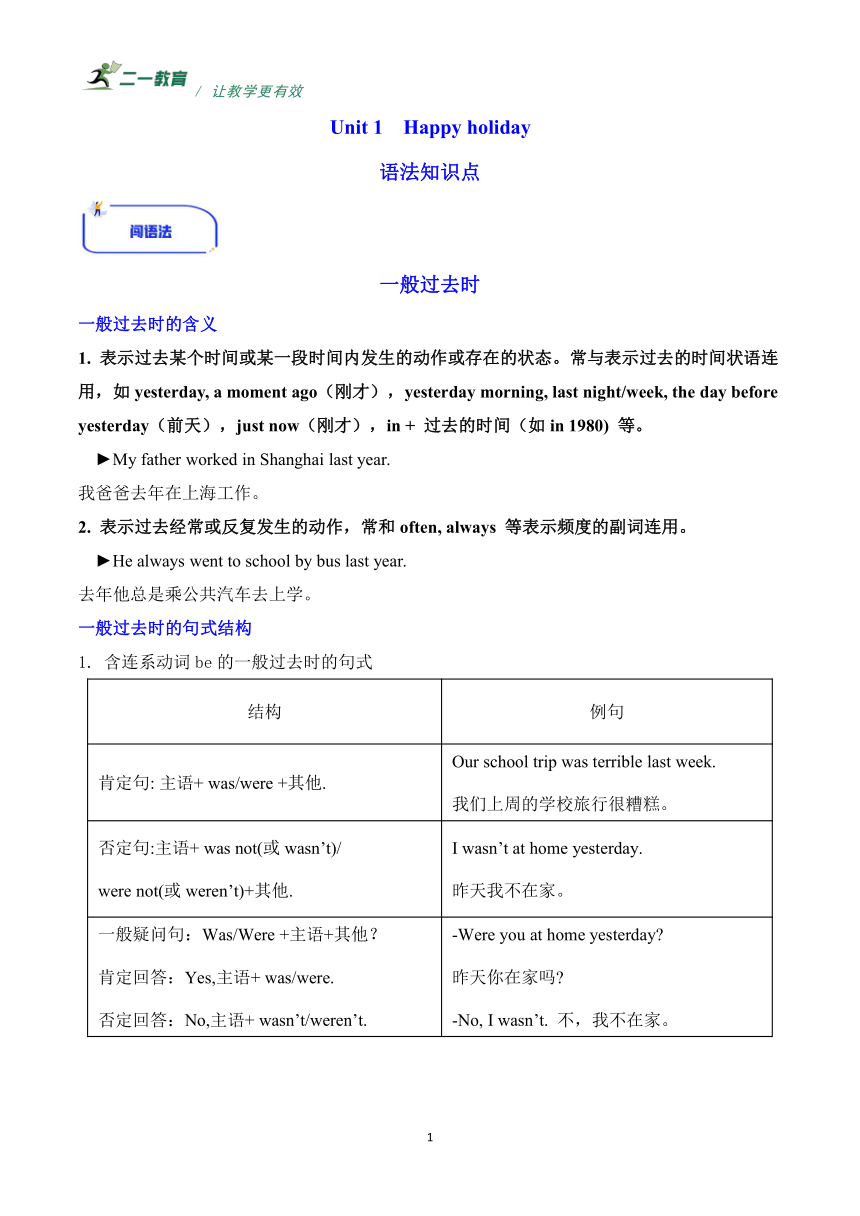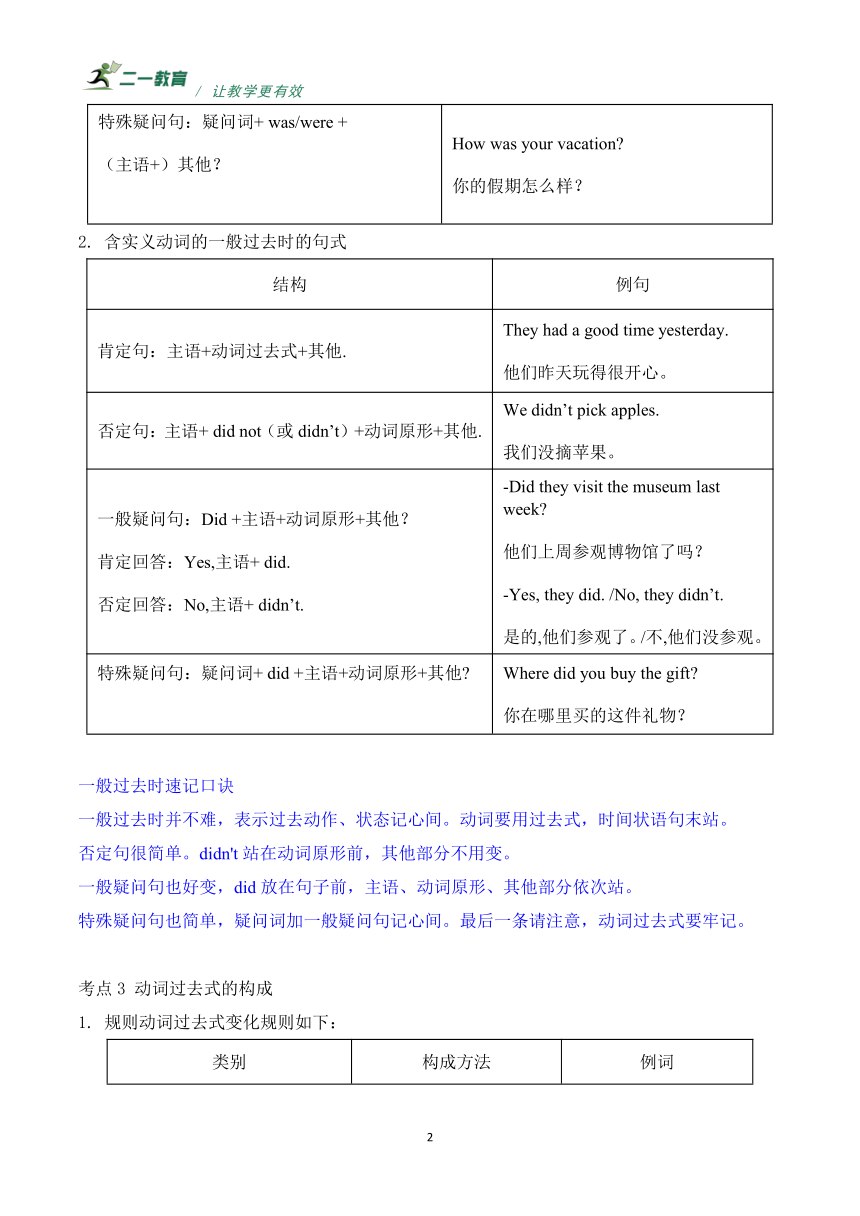Unit 1 Happy holiday语法知识点详解及练习学案【2025人教版英语八年级上册 】
文档属性
| 名称 | Unit 1 Happy holiday语法知识点详解及练习学案【2025人教版英语八年级上册 】 |  | |
| 格式 | docx | ||
| 文件大小 | 63.1KB | ||
| 资源类型 | 试卷 | ||
| 版本资源 | 人教版 | ||
| 科目 | 英语 | ||
| 更新时间 | 2025-05-27 11:44:57 | ||
图片预览


文档简介
/ 让教学更有效
Unit 1 Happy holiday
语法知识点
一般过去时
一般过去时的含义
1. 表示过去某个时间或某一段时间内发生的动作或存在的状态。常与表示过去的时间状语连用,如yesterday, a moment ago(刚才),yesterday morning, last night/week, the day before yesterday(前天),just now(刚才),in + 过去的时间(如in 1980) 等。
My father worked in Shanghai last year.
我爸爸去年在上海工作。
2. 表示过去经常或反复发生的动作,常和often, always 等表示频度的副词连用。
He always went to school by bus last year.
去年他总是乘公共汽车去上学。
一般过去时的句式结构
1. 含连系动词be的一般过去时的句式
结构 例句
肯定句: 主语+ was/were +其他. Our school trip was terrible last week. 我们上周的学校旅行很糟糕。
否定句:主语+ was not(或wasn’t)/ were not(或 weren’t)+其他. I wasn’t at home yesterday. 昨天我不在家。
一般疑问句:Was/Were +主语+其他? 肯定回答:Yes,主语+ was/were. 否定回答:No,主语+ wasn’t/weren’t. -Were you at home yesterday 昨天你在家吗 -No, I wasn’t. 不,我不在家。
特殊疑问句:疑问词+ was/were + (主语+)其他? How was your vacation 你的假期怎么样?
2. 含实义动词的一般过去时的句式
结构 例句
肯定句:主语+动词过去式+其他. They had a good time yesterday. 他们昨天玩得很开心。
否定句:主语+ did not(或didn’t)+动词原形+其他. We didn’t pick apples. 我们没摘苹果。
一般疑问句:Did +主语+动词原形+其他? 肯定回答:Yes,主语+ did. 否定回答:No,主语+ didn’t. -Did they visit the museum last week 他们上周参观博物馆了吗? -Yes, they did. /No, they didn’t. 是的,他们参观了。/不,他们没参观。
特殊疑问句:疑问词+ did +主语+动词原形+其他 Where did you buy the gift 你在哪里买的这件礼物?
一般过去时速记口诀
一般过去时并不难,表示过去动作、状态记心间。动词要用过去式,时间状语句末站。
否定句很简单。didn't站在动词原形前,其他部分不用变。
一般疑问句也好变,did放在句子前,主语、动词原形、其他部分依次站。
特殊疑问句也简单,疑问词加一般疑问句记心间。最后一条请注意,动词过去式要牢记。
考点3 动词过去式的构成
1. 规则动词过去式变化规则如下:
类别 构成方法 例词
一般情况 直接加-ed want→ wanted play→ played
以e结尾的动词 直接加-d live→ lived hope→ hoped
以重读闭音节结尾且末尾 只有一个辅音字母的动词 先双写词尾辅音 字母,再加-ed stop→ stopped plan→ planned
以辅音字母加y结尾的动词 变y为i,再加-ed study→ studied worry→ worried
规则动词的过去式的读音也有规律可循。请记住:
清后/t/;元浊/d/;/t/,/d/之后读/ d/。
(1)清辅音/p/,/k/,/f/,/s/,/ /等后,-ed要读/t/。e.g. worked, finished。
(2)元音或浊辅音/b/,/ɡ/,/v/,/z/,/m/等后,-ed要读/d/。e.g. played, lived。
(3)/t/或/d/后,-ed读/ d/。e.g. started, needed。
2. 不规则动词的过去式的变化各异,需要分别记忆。部分不规则动词过去式的记忆规则如下:
(1)动词的过去式与动词原形一样。e.g. put→ put;cut→ cut;let→ let;read→ read
(2)将i变为a。e.g. begin→ began;drink→ drank;give→ gave;sing→ sang
(3)以d结尾的词,把d变为t。e.g. lend→ lent;send→ sent;build→ built;spend→ spent
(4)中间去e,末尾加t。e.g. keep→ kept;feel→ felt;sleep→ slept;sweep→ swept
(5)过去式以ought或aught结尾的单词。e.g. think→ thought;buy→ bought;bring→ brought;teach →taught;catch→ caught
二 复合不定代词
由 some, any, no, every分别与one, body, thing构成的不定代词称为复合不定代词。
考点1 常见的复合不定代词
one body thing
some someone某人 somebody某人 something 某事;某物
any anyone任何人 anybody任何人 anything 任何事物
no no one无人 nobody无人 nothing 什么都没有
every everyone 每人; 人人;所有人 everybody每人; 人人;所有人 everything 每件事物;一切
考点2 常见用法
1. some-不定代词通常用在肯定句以及表示请求、邀请、建议等希望得到肯定回答的疑问句中;any-不定代词一般用在否定句和疑问句中;no-不定代词一般用在否定句中;every-不定代词可用在任何句子中。
Someone wants to visit you.有人想拜访你。
Did anyone come with you 有人跟你一起来吗?
2. 复合不定代词相当于名词,在句中可作主语、宾语和表语。作主语时,谓语动词用单数形式。
Everything goes well.一切进展顺利。(作主语)
He did everything for you.他为你做了一切。(作宾语)
That was something that he couldn’t understand.那是他无法理解的某种东西。(作表语)
3. 复合不定代词被形容词、动词不定式等修饰时, 形容词、动词不定式等必须后置,结构为“复合不定代词+ 形容词/ 动词不定式”。
I have something important to tell you. 我有重要的事情要告诉你。
I really have something to do. 我确实有事情要做。
记忆口诀
复合不定代词
不定代词美名扬,修饰成分后边藏;
单数动词作谓语,何时何地都一样。
特别提醒:every- 类复合不定代词与not 连用时,表示部分否定;若要表示全部否定,则要用no- 类复合不定代词或在否定句中用 any- 类复合不定代词。
Not everyone likes this book. 并非人人都喜欢这本书。
No one knew how to solve the problem. 没有人知道如何解决这个问题。
I can’t find him anywhere. 我哪儿都找不到他。
语法练习
一 单项选择
1. -It is my first time taking a vacation in Dongying.
-Me too. _______ here is so nice. I love the city.
A. Nothing B. Anything C. Something D. Everything
2. -Tommy, is there _______ in the classroom now
-No. All the students are having a P.E. lesson on the playground.
A. everybody B. somebody C. anybody D. nobody
3. My grandma is very nice and she always cooks _______ for me.
A. wonderful something B. wonderful anything
C. something wonderful D. anything wonderful
4. Linda, the birthday cake looks nice. Who _______ it for you
A. makes B. made C. make D. is making
5. -When _______ your brother _______ to Tianjin
-The day before yesterday.
A. does; return B. did; return C. was; return D. did; returned
6. -_______ you in the city in 2023
-No. I _______ here two months ago.
A. Are; move B. Are; moved C. Were; moved D. Were; move
二 短文填空
This vacation I did 7. __________ special. I visited a friend on her farm with my sisters. It’s only 3 kilometres from my home to the farm, so we 8. __________ (go) there by bike. It was my first time going there, so I was interested in 9. __________ on the farm. In the morning, we 10. __________ (ride) a horse and milked a cow.
It was so much fun. In the afternoon, we 11. __________ (pick) some strawberries. In the evening, there was 12. __________ to do but enjoy the full moon. No 13. __________ felt bored. It was a really wonderful day! 14. ___________ had a great time. What about you Did you do 15. __________ fun this vacation Did you go with 16. ___________
Unit 1 Happy holiday
语法知识点
一般过去时
一般过去时的含义
1. 表示过去某个时间或某一段时间内发生的动作或存在的状态。常与表示过去的时间状语连用,如yesterday, a moment ago(刚才),yesterday morning, last night/week, the day before yesterday(前天),just now(刚才),in + 过去的时间(如in 1980) 等。
My father worked in Shanghai last year.
我爸爸去年在上海工作。
2. 表示过去经常或反复发生的动作,常和often, always 等表示频度的副词连用。
He always went to school by bus last year.
去年他总是乘公共汽车去上学。
一般过去时的句式结构
1. 含连系动词be的一般过去时的句式
结构 例句
肯定句: 主语+ was/were +其他. Our school trip was terrible last week. 我们上周的学校旅行很糟糕。
否定句:主语+ was not(或wasn’t)/ were not(或 weren’t)+其他. I wasn’t at home yesterday. 昨天我不在家。
一般疑问句:Was/Were +主语+其他? 肯定回答:Yes,主语+ was/were. 否定回答:No,主语+ wasn’t/weren’t. -Were you at home yesterday 昨天你在家吗 -No, I wasn’t. 不,我不在家。
特殊疑问句:疑问词+ was/were + (主语+)其他? How was your vacation 你的假期怎么样?
2. 含实义动词的一般过去时的句式
结构 例句
肯定句:主语+动词过去式+其他. They had a good time yesterday. 他们昨天玩得很开心。
否定句:主语+ did not(或didn’t)+动词原形+其他. We didn’t pick apples. 我们没摘苹果。
一般疑问句:Did +主语+动词原形+其他? 肯定回答:Yes,主语+ did. 否定回答:No,主语+ didn’t. -Did they visit the museum last week 他们上周参观博物馆了吗? -Yes, they did. /No, they didn’t. 是的,他们参观了。/不,他们没参观。
特殊疑问句:疑问词+ did +主语+动词原形+其他 Where did you buy the gift 你在哪里买的这件礼物?
一般过去时速记口诀
一般过去时并不难,表示过去动作、状态记心间。动词要用过去式,时间状语句末站。
否定句很简单。didn't站在动词原形前,其他部分不用变。
一般疑问句也好变,did放在句子前,主语、动词原形、其他部分依次站。
特殊疑问句也简单,疑问词加一般疑问句记心间。最后一条请注意,动词过去式要牢记。
考点3 动词过去式的构成
1. 规则动词过去式变化规则如下:
类别 构成方法 例词
一般情况 直接加-ed want→ wanted play→ played
以e结尾的动词 直接加-d live→ lived hope→ hoped
以重读闭音节结尾且末尾 只有一个辅音字母的动词 先双写词尾辅音 字母,再加-ed stop→ stopped plan→ planned
以辅音字母加y结尾的动词 变y为i,再加-ed study→ studied worry→ worried
规则动词的过去式的读音也有规律可循。请记住:
清后/t/;元浊/d/;/t/,/d/之后读/ d/。
(1)清辅音/p/,/k/,/f/,/s/,/ /等后,-ed要读/t/。e.g. worked, finished。
(2)元音或浊辅音/b/,/ɡ/,/v/,/z/,/m/等后,-ed要读/d/。e.g. played, lived。
(3)/t/或/d/后,-ed读/ d/。e.g. started, needed。
2. 不规则动词的过去式的变化各异,需要分别记忆。部分不规则动词过去式的记忆规则如下:
(1)动词的过去式与动词原形一样。e.g. put→ put;cut→ cut;let→ let;read→ read
(2)将i变为a。e.g. begin→ began;drink→ drank;give→ gave;sing→ sang
(3)以d结尾的词,把d变为t。e.g. lend→ lent;send→ sent;build→ built;spend→ spent
(4)中间去e,末尾加t。e.g. keep→ kept;feel→ felt;sleep→ slept;sweep→ swept
(5)过去式以ought或aught结尾的单词。e.g. think→ thought;buy→ bought;bring→ brought;teach →taught;catch→ caught
二 复合不定代词
由 some, any, no, every分别与one, body, thing构成的不定代词称为复合不定代词。
考点1 常见的复合不定代词
one body thing
some someone某人 somebody某人 something 某事;某物
any anyone任何人 anybody任何人 anything 任何事物
no no one无人 nobody无人 nothing 什么都没有
every everyone 每人; 人人;所有人 everybody每人; 人人;所有人 everything 每件事物;一切
考点2 常见用法
1. some-不定代词通常用在肯定句以及表示请求、邀请、建议等希望得到肯定回答的疑问句中;any-不定代词一般用在否定句和疑问句中;no-不定代词一般用在否定句中;every-不定代词可用在任何句子中。
Someone wants to visit you.有人想拜访你。
Did anyone come with you 有人跟你一起来吗?
2. 复合不定代词相当于名词,在句中可作主语、宾语和表语。作主语时,谓语动词用单数形式。
Everything goes well.一切进展顺利。(作主语)
He did everything for you.他为你做了一切。(作宾语)
That was something that he couldn’t understand.那是他无法理解的某种东西。(作表语)
3. 复合不定代词被形容词、动词不定式等修饰时, 形容词、动词不定式等必须后置,结构为“复合不定代词+ 形容词/ 动词不定式”。
I have something important to tell you. 我有重要的事情要告诉你。
I really have something to do. 我确实有事情要做。
记忆口诀
复合不定代词
不定代词美名扬,修饰成分后边藏;
单数动词作谓语,何时何地都一样。
特别提醒:every- 类复合不定代词与not 连用时,表示部分否定;若要表示全部否定,则要用no- 类复合不定代词或在否定句中用 any- 类复合不定代词。
Not everyone likes this book. 并非人人都喜欢这本书。
No one knew how to solve the problem. 没有人知道如何解决这个问题。
I can’t find him anywhere. 我哪儿都找不到他。
语法练习
一 单项选择
1. -It is my first time taking a vacation in Dongying.
-Me too. _______ here is so nice. I love the city.
A. Nothing B. Anything C. Something D. Everything
2. -Tommy, is there _______ in the classroom now
-No. All the students are having a P.E. lesson on the playground.
A. everybody B. somebody C. anybody D. nobody
3. My grandma is very nice and she always cooks _______ for me.
A. wonderful something B. wonderful anything
C. something wonderful D. anything wonderful
4. Linda, the birthday cake looks nice. Who _______ it for you
A. makes B. made C. make D. is making
5. -When _______ your brother _______ to Tianjin
-The day before yesterday.
A. does; return B. did; return C. was; return D. did; returned
6. -_______ you in the city in 2023
-No. I _______ here two months ago.
A. Are; move B. Are; moved C. Were; moved D. Were; move
二 短文填空
This vacation I did 7. __________ special. I visited a friend on her farm with my sisters. It’s only 3 kilometres from my home to the farm, so we 8. __________ (go) there by bike. It was my first time going there, so I was interested in 9. __________ on the farm. In the morning, we 10. __________ (ride) a horse and milked a cow.
It was so much fun. In the afternoon, we 11. __________ (pick) some strawberries. In the evening, there was 12. __________ to do but enjoy the full moon. No 13. __________ felt bored. It was a really wonderful day! 14. ___________ had a great time. What about you Did you do 15. __________ fun this vacation Did you go with 16. ___________
同课章节目录
